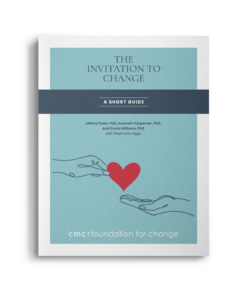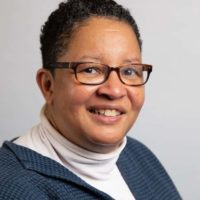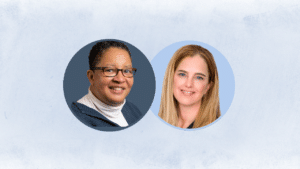Recently we got to sit down with Rev. Jan M. Brown, the Founder and Executive Director of SpiritWorks Foundation, a Recovery Community Organization (RCO) based in Williamsburg, VA.
Jan spoke with two of our staff, Kayla Brady and Elliot Foote, about community, substance use, and the importance of practice.
This conversation has been edited for length and clarity.
My name is Jan Brown. I am a woman in long term recovery, and that means I haven’t used drugs or alcohol for the past 34 years.
I am the Founder and Executive Director of SpiritWorks Foundation, which is currently operating through two Recovery Community Centers, one in Warrenton, Virginia and one in Williamsburg, Virginia.
I’m also an ordained Deacon in the Episcopal Church, and I serve at Bruton Parish Church in Williamsburg, Virginia.
How did you get started in the work you’re currently doing?
I initially got started in the recovery field by working at a drug and alcohol treatment center for health care professionals. As I was working there, I saw many people relapse and return to use, and I created SpiritWorks as a place to help people transition from treatment to the community.
The original question was, “what will someone do with the other 23 hours of their day that they’re not in a meeting?”
Or, after a three-month program, “what will someone do on day 91?”
How has SpiritWorks evolved over time? What programs did you start with?
SpiritWorks started in 2005. So last year we celebrated 15 years!
Happy birthday!
Thank you. It was a heck of a 15th birthday, but that’s okay.
We started in my living room, with a group called Women’s 16 Steps. It was made for those who wanted to grow beyond 12 step meetings or who felt that the 12 steps didn’t really speak to them. Primarily those were women and folks who were marginalized, who the group was a good fit for.
We also work with children. For several years we offered a summer camp for children who are growing up with addiction in their lives. One of the highlights of that was that they got to be around other children who understood.
We offered it for several years – one of the cool things was that it was featured on the BBC, that was fun – and then last year, because of COVID, we had to take the year off. We’re looking forward to being back with the kids this summer.
Recently, a really big transition in our work has been working more robustly and more directly with family members, and particularly with parents. That certainly wasn’t where we started. I had an interest, but we didn’t have any formal offerings for families.
But what started happening was that parents would come to me and say, “what do we do?”
And a couple of those folks asked if we could start a parents group. Some had loved ones who had been in treatment centers with a family program, but they wanted something beyond that.
Right, it’s similar to what you said before. Even when there is a family program, what do you do once it’s over for the day?
23 hours in their day?”
Could you talk a little bit about your motivation to remain in the addiction landscape?
It’s the children.
One of my goals in life, my missions, is to make a difference in the life of a child. And so it’s been about figuring out how best to do that.
When it comes to addiction, we know where the next generation of people with addiction are: many are growing up in the households of people who are struggling. And yet we do very little for them. It just doesn’t make any sense.
I think these young people can have a really good life. And the grown-ups as well. We need to break the intergenerational cycle of addiction in families.
And so, I’ve stayed with it.
Sure. I think one of the things that was really important [in that process] was this notion, in the 12 Steps, of having to ‘admit that you’re powerless.’
For women, for people of color, for LGBTQIA folks – powerlessness does not inspire change. Many of them have been told all of their lives that they’re powerless. So that’s not a helpful model to work out of.
For people with any experience of abuse or trauma, as well, the hierarchical and patriarchal nature of the 12 Steps is not accessible. As well as for those who aren’t interested in having God, as they understand God, be part of their recovery.
But 15 years ago there weren’t things like Dharma Recovery and CRAFT. 12 Steps was the best game in town, so that’s what people relied upon.
We started using the 16 Steps as a way to step away from that. To step away from [the 12 Steps] being the only thing that was offered. It was about resilience, and it felt much more empowering.
It’s interesting to think about the idea of “powerlessness” that is so common in the 12 Step model, and how it doesn’t work for some people.
Yeah – I used to be told, “Look in the mirror, you’re the problem.”
And one day I said, “Well, I’m looking in the mirror, and it must mean I’m the solution too.”
They didn’t necessarily appreciate that, but I felt like – stop beating me up! I can do that all by myself.
I’m already doing that!
[Laughter]
Is that shift in perspective something you work on with families as well?
Very much so. Early on in the recovery movement, families were actually considered “the problem.” So they weren’t included in treatment or in recovery.
They didn’t get any help, they didn’t get any support – and we’re still trying to overcome that. Because now, they often think it’s their fault.
Right, many family members have been told that staying involved in their loved one’s life is ‘enabling’ their substance use. What is it like to share a different viewpoint with parents?
I was talking with a mom recently, and actually stopped her as she was talking about enabling and said, “We’ve got to stop calling you all names. You’re not an enabler. You’re not trying to continue your child’s use, you’re trying to support them.”
And next day, she called me and thanked me because nobody had ever told her that before.
Often, families are just ill-equipped. They don’t have the tools. Much like people who are learning to navigate recovery don’t have the tools, at first.
In our experience, parents and loved ones who want to help sometimes get nervous that they’ll ‘do it wrong’ or will say the wrong thing. And with the ITC, we’re trying to make sure people know that that’s ok. It doesn’t have to be perfect, and you can keep working on it.
For me, practice has always been something that’s really important.
It’s the age-old idea that you have to practice if you want to get better at something. And many parents have been willing to receive that idea. They’ll show up and say, “We’re here to practice.”
And I’ll say “Okay. Alright, let’s do it.”
It is powerful to see folks continue to show up for their loved ones. And it doesn’t have to be limited to parents or family members. Change is change is change.
I see us as – we’ve always been a change-agent organization. SpiritWorks is about leading with love and having love in your heart before you say something. And [the ITC Approach] helps us get there even when we don’t have the love in our heart.
[Laughter]
You need to check in with your self-awareness and your self-compassion, so you can go out and be kind.
So much of the focus, in recovery, has been on stopping a behavior. In abstinence you remove this and replace it with something else.
But change is a transformational process. And I see the Invitation to Change as a transformation. It allows you to change in a really powerful way, and to keep that change.




